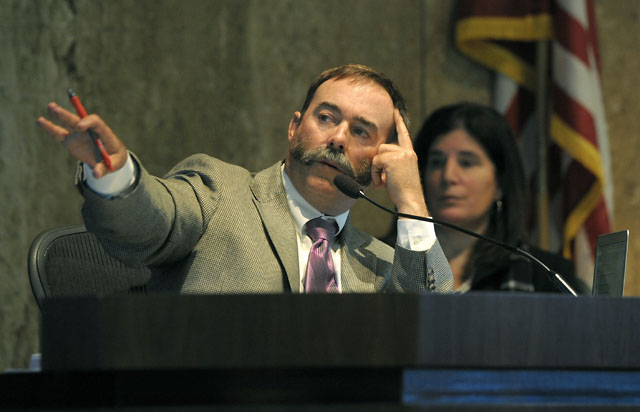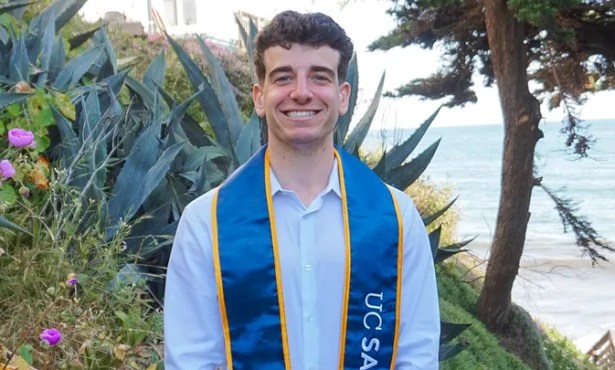Peter Adam Pounds the Pavement
Supervisor Fed Up With Shabby Roads, Buildings, and Parks

Supervisor Peter Adam no longer wants to take the route of unmaintained roads, unkempt parks, and lackluster county buildings. Since his election to the Board of Supervisors earlier this year, Adam has argued that his colleagues aren’t doing enough to address the $300 million deferred-maintenance backlog for county-owned roads, parks, and buildings. But after Adam’s argument for increased spending at June’s budget talks hit a wall with his fellow supervisors, he decided to travel a different path: a ballot initiative.
“I didn’t get sent here to stand around and not do anything,” said Adam, who supervises the 4th District. “I thought that I’d better do something more positive than stand around and see if they decide to fund it next year. If you don’t do it, it’s just going to get worse. You and your children will be driving around on third-world roads and visiting third-world county buildings.”
If it passes, the initiative — called the County Facilities Maintenance Ordinance — would require that the heads of the Public Works, Parks, and General Services departments inform the county CEO each year on how to maintain roads, parks, and buildings at their current conditions. The CEO would then have to pass that information along to the Board of Supervisors, who would be responsible for seeing that those conditions are kept; if the infrastructure improves over time, the best conditions would set the bar. The ordinance states that the board wouldn’t be allowed to go into debt for the maintenance (unless it’s voter approved) but can otherwise fund the work however it sees fit.
Adam said that concerns about the ordinance potentially tying future supervisors’ hands aren’t warranted and that the current state of the county’s facilities — which he said includes ceiling damage, leaky pipes, rodent and cockroach infestations, and subpar bathrooms — needs attention. “They may have a bake sale, or liquidate property, or put a tax on the ballot,” Adam said. “There are options out there, and we can explore the options. Unless this initiative happens, I’m afraid that’s not going to happen.”
In June, the supervisors approved an $844.5 million budget. Based on figures he got from Scott McGolpin, director of Public Works, Adam advocated that the roads needed $12 million to keep them at their current state. His colleagues, however, voted for $5 million, which was $2 million more than originally anticipated. According to McGolpin and assistant CEO Renée Bahl, the county’s deferred maintenance price tag is currently $300 million, $250 million of which is for roads, $30 million for buildings, and $20 million for parks.
The quality of the country’s roads — approximately 1,700 lane miles not owned by cities or the state — McGolpin explained, is rated by a metric called the Pavement Condition Index (PCI), which grades on a bad-to-good scale of 0-100. The industry standard, McGolpin said, is a PCI of 70 or higher, but the county’s score is 61. To go above and beyond maintaining that number and actually increasing it, McGolpin said his department would need $20 million every year for the next 10 years.
The other supervisors have voiced concerns about the initiative, saying they want to focus more on public safety — including getting the North County Jail built — and that prioritizing deferred maintenance, however important an issue, would mean eating into the county’s $29 million rainy-day fund. “We have a lot of competing interests,” said 2nd District Supervisor Janet Wolf, who cited recent improvements at Tucker’s Grove and Arroyo Burro Beach in her district. “We have to take measured steps in approaching these things.”
First District Supervisor Salud Carbajal echoed the need for that approach. “This is not a one-trick-pony job,” he said. “We’re voted in to balance a number of issues and needs in our county.” Saying that he is fine with letting the voters have their say but that his top priority remains public safety, 5th District Supervisor Steve Lavagnino said that with this proposed initiative, his colleague has already achieved something. “He’s elevated the conversation, which I totally give him credit for,” Lavagnino said.
Adam’s team, composed of volunteers and a consulting firm based in Calabasas, just started the signature-gathering process last weekend (they said figures aren’t available yet), and if they want to get the initiative on the June 2014 ballot — just ahead of the budget talks for the 2014-2015 fiscal year — they will need to round up 13,201 signatures by the end of November. The supervisors are set to hold a hearing on a maintenance plan on October 15.



